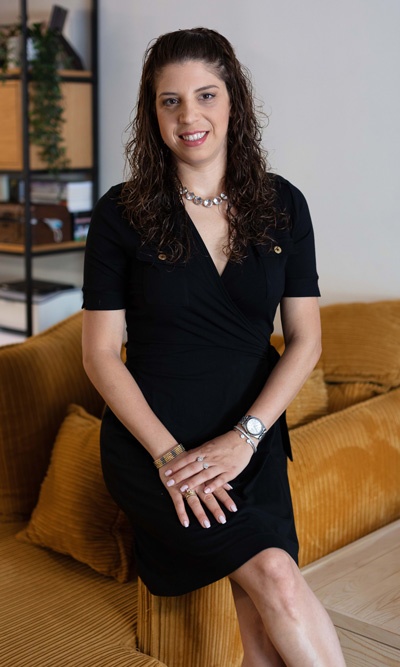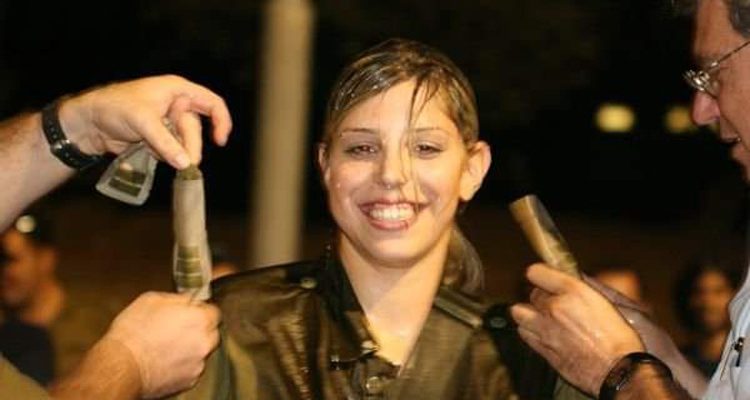Today she is a successful lawyer who specializes in medical rights. Fifteen years ago, Linoy Olenik was the Battalion’s liaison officer in the Kfar Giladi disaster, and the woman who had to identify the victims of the disaster.
“Learning to live with it.”
Noon, August 6, 2006. The reserve soldiers from a battalion of the Northern Paratroopers Brigade gather in the parking lot near the cemetery of Kibbutz Kfar Giladi. The soldiers deploy equipment and ammunition and prepare to leave for Lebanon. Linoy “Luna” Olenik, a Battalion Liaison Officer, reservist and Law student who had received an emergency call-up to help prepare the Battalion for fighting, was very busy arranging the soldiers’ rosters: who has gone in and who has stayed in Israel.
“Then,” Luna recalls, “some religious soldiers asked me to drive them to pray with a group not far from us. When I was about to leave, Yossi Kashkash, who we nicknamed ‘Everyone’s Dad’, came up to me and said, ‘I want a hug from you.’ I didn’t quite understand why but I hugged him.”
A minute after leaving the meeting grounds, a Katyusha fell on the spot. Yossi and 11 other soldiers were killed and 31 wounded in what became known as the “Kfar Giladi Disaster”.
At this point began a sequence of days that Luna carries with her to this day. She identified the bodies of the dead gathered in a sports hall on the kibbutz, went on to identify the dead and wounded at Ziv Hospital in Safed, and from there in a mad race to the families of the dead who began to sit ‘Shiva’ and the other wounded scattered in the hospitals. At the same time, she looked after the soldiers of the Battalion who had already entered the fight inside Lebanon and had even lost another soldier during the fighting. For her performance during and after the disaster, she received a commendation.
“I knew all the Battalion soldiers, and it was expected that I should be asked to identify the bodies. But then we found out that according to Judaism it is forbidden for a woman to do so.” she recalls. “After negotiations with the IDF Rabbinate, it was agreed that I would identify the bodies on the condition that our Lieutenant Colonel would accompany me throughout the process. I went over each body and told everything I know about the person: name, address, age, his wife’s name, children’s names, identification marks like scars. Not an easy experience”.
The Writing Was On the Wall
Three years after the incident, a comrade and member of the Battalion, offered Linoy to join him and two other officers from the Battalion on a delegation to the Netherlands on behalf of an organization called “For Tomorrow’s Path”. She responded immediately that she agrees to go, as for her it was an opportunity to take a break from Law School and grapple with the mental distress that had been with her since the war.
“I was a student with no financial means, and I said ‘Sure, I don’t mind a trip abroad with friends.’ Only later did I learn that this organization was organizing trips for former combatants for the purpose of going through a mental and emotional processing of the combat events they experienced. All day we were on a ship sailing on the canals, and occasionally we stopped for shopping in the villages. The rest of the time, there were talking sessions and emotional soul searching”.
Were you surprised by what you discovered?
“It was on my trip to the Netherlands, I first realized that I was post-traumatic. Everything I had been through in the years since the war – vomiting, itching, sweating and sleep deprivation – is part of what is called post-trauma. Up until then I just thought there was something wrong with me being so obsessed with the wounded and with death. Only after the trip did I understand there’s something wrong with me and something needs to be done about it”.
And what did you do?
“Because I was accumulating so much anger, initially, I sat down and wrote letters to those I was angry with. I asked them, ‘How come you never told me there’s something was wrong with me?’ I asked my parents why they never ask me about what happened to me. There were many articles about me in the media after the disaster. My father said he could not fathom the thoughts of what his daughter and seen, what I saw. I consulted with friends and decided to file a claim for disability from the Ministry of Defense. It was all rather odd, because in previous years I was the one who represented the wounded vis a vis the Ministry. When I filed the claim, the guys at the Rehabilitation Division who knew me told me that in my case the writing had been on the wall.”

Mom copes
After the war, Luna continued to do Reserves duty in the Battalion on a regular basis, and there were years when she served on dozens of annual Reserve days.
She became Omer’s partner, one of the fighters in the Battalion, and later the two got married. Today Omer works closely with her and is responsible for the business development of her law firm. “It was not an easy task to bring the unit back to operational status after such a disaster,” she describes. “We lost key figures and I, who began studying Law, volunteered to look after the rights of the injured vis a vis the Rehabilitation Division of the Ministry of Defense. I don’t know how I didn’t drop out of school during that period.”
Luna was recognized as having a 20 percent disability and began treatment with a psychiatrist who works with the Ministry of Defense, and with whom she maintains contact to this day. “I had some difficult years, and I was taking medication. There were also suicide attempts. Omer went through everything with me. At one point, the District doctor even wanted to hospitalize me, and I refused. In time you realize that you learn to live with it, even if it is not easy.”
In 2011, Luna and Omar had their first daughter, and later another son and daughter. “The first one was born into the reality of a struggling mother,” she says. “She would be the first to identify when I had a seizure. ‘Mommy has a headache’ she would say. After her birth I had three consecutive miscarriages, and they too, were probably caused by the mental condition.”
With three children, a nice house in Ra’anana, running and managing a thriving law firm with three branches around the country, Luna is an expert in representing the injured and sick before the National Insurance Institute and before the Rehabilitation Division at the Ministry of Defense.
“I help them benefit financially from their medical condition. I have the professional knowledge and an understanding of their mental condition. Someone like me knows how a wounded person feels on the eve of appearing before a medical committee. Who better than I know how it feels when a wounded veteran tries to commit suicide and is then accused of putting on a charade. Not a week goes by that I do not deal with the army – meetings, treatments, and contact with families.”
The transparent disability: Does your personal experience enable you to better identify with clients?
“In recent years, I have been lecturing at various associations of people with illnesses about their rights, associations of Multiple Sclerosis, Cancer, what not. When I say that I am an IDF disabled veteran, they do not believe me, because I have not lost an arm or a leg. I explain to them that post-trauma is called the ‘transparent disability’. One can lose an arm or a leg and learn to live with a prosthesis. A mentally ill person cannot learn to live with the nightmares or not knowing when the next attack will come, and that is very, very important to understand”.
You are actually marking 15 years of dealing with post-trauma.
“Every year we meet twice, once on Memorial Day, Yom Hazikaron, for the fallen IDF soldiers, and at the annual commemoration ceremony for the Battalion’s casualties. This year the ceremony for the families will take place on Friday, August 6, exactly on the 15th anniversary of the disaster.
I have no doubt that my life looks the way it does today because of the war. This is the single most decisive event that has molded my life. Most of my friends are from the unit, and I practice medical rights following my experience. However, I admit that my disability still manages me. I know that if I do not sleep well at night, the seizure may return. So, I make sure not to step over the lines. I am not as happy a person as I used to be, but I am no longer angry with myself, and learning to live with feelings of guilt. In the past, when I felt unwell, I would hide it and say I was sick. Not anymore today.”
For years, Linoy has been assisting the Zahal Disabled Veterans Organization. She volunteers at the organization’s branch in the city of Ra’anana and helps IDF disabled veterans who seek legal advice.
A few years ago, Linoy took part in a ski delegation hosted by the Beit Halochem Friends Association in Geneva.
Story by Dudu Levy Reich
Photos by Benny Adam

Comments are closed.